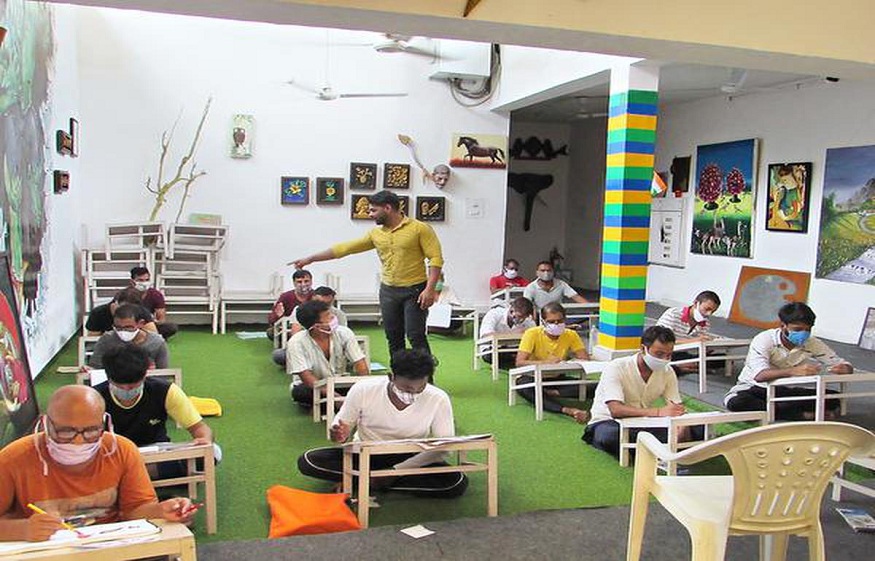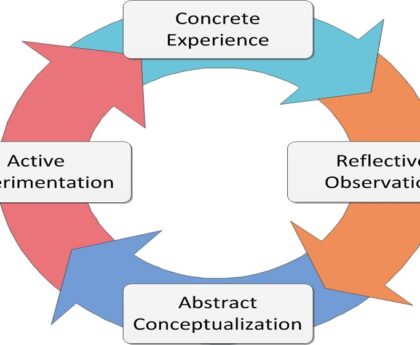Often in a situation of dropping out of school, many prisoners decide despite everything to go back to school to anticipate their professional reintegration. Far from the classic high school classrooms, they work all year on their exams from their prison. By Mathieu Michel
We went to the Hauts-de-Seine remand center, located in Nanterre, to investigate the study conditions of the detainees. The latter received relatively short sentences that rarely exceed 4 years, which is not conducive to long university studies. Thus, the prison essentially offers secondary level training . 22 teachers are responsible for teaching the courses, including 7 full-time. Doctoral students from the University of Paris-Nanterre, a stone’s throw from the prison establishment, also participate by providing some courses.
Building C, between 200 and 300 students
It is in a small computer room that the mathematics course of a Bac Pro class takes place . Internet access being prohibited, the ten computers are only used to use software such as GeoGebra. The 4 students, attentive, listen to Abdel, their teacher, who writes on the board a lesson plan on derived functions. This morning there are 3 students missing, absent for various reasons. At the start of the year, there were 10 of them, but some have given up on their diplomas. Others, awaiting a court decision, have since been released and will have to take their exams as a free candidate. In Building C, between 200 and 300 students, often quite young, attend classes each year. Classes for minors are made up of a maximum of 5 students in order to provide the best education for the youngest since school is still compulsory for them. For adult prisoners, this is a purely voluntary decision since they have chosen to resume their studies. To reach Building C, they must then face a long wait for assignment (sometimes up to a year), change cell and fellow prisoner and above all the pace of life.
A path to reintegration
JPEG – 53 KB Among the students, Romain, aged 28, awaiting trial, left school 10 years ago. At the time he was in 1st STG (ex- STMG ). Today, he is trying to get a Bac Pro and as the exams approach, he is confident: ” I would like to work in the human resources sector when I get out of prison, so I prefer to study management, a practical subject and concrete that will be useful to me in the context of my future job. Faced with the particular motivation and insistence of students like Romain,the management will set up a BTS course from the start of the school year .
Sylvie Paré, the director of the school centre, confides to us that “ obtaining a diploma allows prisoners to develop their self-esteem and gain confidence. Above all, it is a definitive way out to say goodbye to prison ”. In fact, studying facilitates reintegration on release but also represents a way of escaping the routine of prison, as Romain confirms to us: “ My Bac Pro occupies the vast majority of the day. The time I spend in the classroom or even studying in my cell is time when I don’t think about the rest. I even dread the July-August break a little, when there will be no more classes… “Paul, also in Bac Pro, projects more in the administration. The professional projects of each vary a lot but each prisoner has a relatively precise idea of the activity he wishes to exercise after his sentence.
What job are you made for ? take the test to find out
Education not without obstacles
Normally, the courses should last 3 hours but they remain subject to the vagaries of prison life. By the time each prisoner has access to the classrooms, the lessons very rarely start at the scheduled times. Yet teachers adapt and find the time to complete the programs . Students see their administrative appointments fall on fixed dates, sometimes during class hours and are forced to miss the same class all year. It is therefore difficult to excel in a subject which one cannot follow the teaching. They will have to compensate with other subjects by avoiding the eliminatory mark of 0/20 in the one in question.
Outside class hours, they occupy the library when it is free, especially for case studies which require a little space. Otherwise they revise in the cell on a small table which they use as a desk, kitchen and storage space and which they must share with their fellow prisoner. Even cramped, this does not prevent them from revising.
A motivated and committed staff
In the corridors of the school center, the director Sylvie Paré addresses a personal word to each of the detainees. What she wants above all is their reintegration. Her favorite moment? When she tells them they’ve just graduated. Relief, tears… she has known it all. Each time, the same satisfaction of the accomplished task and the concretization of the efforts of all the educational team .
JPEG – 59.8 kbDuring our interview, she receives a call to tell her that a Terminale student has just been imprisoned in Nanterre. Less than a month from the Bac , she must hurry to register him as a free candidate with the Maison des Examinations to allow him to compose in the best conditions on D-Day.
We find Abdel, the mathematics teacher. He started teaching in prison 7 years ago and ended up making it his full-time job. “ It was above all the challenge that motivated me he says. Most of the inmates have been away from school for a long time. It is a question of remobilizing notions normally acquired and relying on them to master new ones. The teacher, invested, notes a heterogeneity of level within the classes , which is felt more than in high school: “ It forces me to redouble my work by teaching in a more personalized way. I have to adapt to each profile ”. But the classes being reduced in terms of numbers, learning works well and this allows the remand center to display an average success rate of around 95% on all the exams prepared.
On leaving detention, many turn to a BTS , few continue to university. Most of them try above all to enter the labor market as quickly as possible. It is clear that obtaining a diploma while in prison considerably reduces the recidivism rate .





